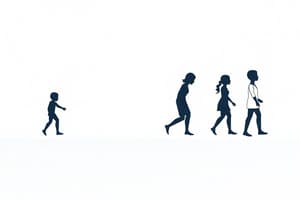Podcast
Questions and Answers
What principle of development emphasizes whether traits remain stable or undergo change throughout a person's life?
What principle of development emphasizes whether traits remain stable or undergo change throughout a person's life?
- Critical vs. Sensitive Periods
- Nature vs. Nurture
- Continuity vs. Discontinuity
- Stability vs. Change (correct)
Which type of research method allows for manipulation of variables to determine cause-and-effect relationships in development?
Which type of research method allows for manipulation of variables to determine cause-and-effect relationships in development?
- Case Studies
- Observational Studies
- Experiments (correct)
- Correlational Studies
During which period do specific experiences become necessary for normal development to occur?
During which period do specific experiences become necessary for normal development to occur?
- Critical Periods (correct)
- Life Stages
- Transitional Phases
- Sensitive Periods
What does the Nature vs. Nurture debate primarily address in regards to development?
What does the Nature vs. Nurture debate primarily address in regards to development?
Which aspect of development emphasizes the importance of social interactions throughout life?
Which aspect of development emphasizes the importance of social interactions throughout life?
What is the focus of developmental psychology?
What is the focus of developmental psychology?
Which period of development is characterized by the formation of organs and systems?
Which period of development is characterized by the formation of organs and systems?
During which developmental stage does formal education become central?
During which developmental stage does formal education become central?
What does Piaget's theory emphasize about cognitive development?
What does Piaget's theory emphasize about cognitive development?
What role does Vygotsky's sociocultural theory emphasize in cognitive development?
What role does Vygotsky's sociocultural theory emphasize in cognitive development?
What is a key characteristic of the adolescence stage of development?
What is a key characteristic of the adolescence stage of development?
Erikson's psychosocial theory suggests individuals face challenges at various life stages. What is the nature of these challenges?
Erikson's psychosocial theory suggests individuals face challenges at various life stages. What is the nature of these challenges?
Which developmental period is focused on attachment formation and language acquisition?
Which developmental period is focused on attachment formation and language acquisition?
Flashcards
Discontinuous Development
Discontinuous Development
The idea that development occurs in a series of distinct stages with significant changes between each stage.
Nature vs. Nurture
Nature vs. Nurture
This debate explores the relative importance of genetics (nature) and environment (nurture) in shaping development.
Critical Periods
Critical Periods
These periods are specific times in development when certain experiences are crucial for normal development to occur.
Sensitive Periods
Sensitive Periods
Signup and view all the flashcards
Observational Studies
Observational Studies
Signup and view all the flashcards
Developmental Psychology
Developmental Psychology
Signup and view all the flashcards
Prenatal Period
Prenatal Period
Signup and view all the flashcards
Infancy and Toddlerhood
Infancy and Toddlerhood
Signup and view all the flashcards
Piaget's Theory of Cognitive Development
Piaget's Theory of Cognitive Development
Signup and view all the flashcards
Vygotsky's Sociocultural Theory
Vygotsky's Sociocultural Theory
Signup and view all the flashcards
Erikson's Psychosocial Theory
Erikson's Psychosocial Theory
Signup and view all the flashcards
Study Notes
Key Themes in Developmental Psychology
- Developmental psychology investigates physical, cognitive, social, and emotional changes across the lifespan.
- It explores the processes behind these changes, from infancy to old age.
- Factors influencing development include: genetics, environment, and experiences.
Periods of Development
- Prenatal Period: From conception to birth, significant physical development occurs, including organ and system formation. Environmental factors (teratogens) can impact development.
- Infancy and Toddlerhood (birth-3 years): Focuses on fundamental motor skills, sensory development, language acquisition, and attachment formation.
- Early Childhood (ages 3-6): Marked by rapid cognitive development (symbolic thinking, imagination, pre-operational reasoning). Social interaction and play are crucial.
- Middle Childhood (ages 6-12): More complex reasoning, understanding of abstract concepts, friendship formation, and the importance of formal education.
- Adolescence (ages 12-18): Significant physical changes (puberty), identity development, exploration of independence and relationships, and continuing cognitive development.
- Adulthood: Covers young adulthood to old age, encompassing career development, intimacy, parenthood, and aging.
- Late Adulthood (Senescence): Changes in physiological aging, cognitive abilities, and social networks are key themes.
Key Theories in Developmental Psychology
- Piaget's Theory of Cognitive Development: Children progress through distinct stages (sensorimotor, preoperational, concrete operational, formal operational) of understanding the world.
- Vygotsky's Sociocultural Theory: Cognitive development is influenced by social interaction and culture, highlighting the zone of proximal development (ZPD).
- Erikson's Psychosocial Theory: Individuals face psychosocial crises at different life stages, shaping personality development through successful resolution.
Principles of Development
- Continuity vs. Discontinuity: Development occurs either gradually or in distinct stages.
- Nature vs. Nurture: The interplay between genetics and environment in shaping development.
- Stability vs. Change: The extent to which early traits persist throughout life.
Critical and Sensitive Periods
- Critical Periods: Specific times when certain experiences are crucial for normal development.
- Sensitive Periods: Times when specific experiences significantly impact development, but are not essential.
Influencing Factors
- Genetics: Physiological characteristics, predispositions, and temperament are influenced by genes.
- Environment: Family, culture, socioeconomic status, and other social contexts impact development.
- Social Interactions: Throughout life, interactions with others are critical, especially for social-emotional and cognitive growth.
Methods in Developmental Research
- Observational Studies: Observing behavior in natural or structured settings.
- Experiments: Manipulating variables to establish cause-and-effect relationships between developmental factors.
- Correlational Studies: Examining relationships between variables to identify associations.
- Case Studies: In-depth investigations of individuals or small groups to gain insights into developmental issues.
Studying That Suits You
Use AI to generate personalized quizzes and flashcards to suit your learning preferences.




